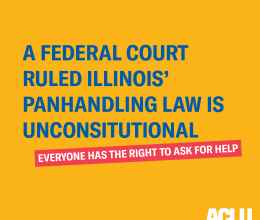This week, the Illinois House and Illinois Senate passed Senate Bill 1342, a measure designed to replace the Illinois Eavesdropping Act which was struck down by the Illinois Supreme Court earlier in 2014. The ACLU of Illinois worked closely with members of both the House and Senate to secure passage of a measure that restored all-party consent for audio recording conversations in Illinois and provides needed protections for civilians audio recording public officials doing their public duty in a public place. While the ACLU welcomed these developments that the measure also included an expansion of authority for police to record conversations without a judicial warrant.
Read the ACLU's full statement:
It is good that the new eavesdropping statute enacted during the veto session generally protects our reasonable expectations of privacy in our conversations, phone calls, and electronic communications from unwanted recording or interception, and that it does so without intruding on our First Amendment right to expose government misconduct by recording the non-private conversations of on-duty government officials. The new statute does this by prohibiting the recording and intercepting of only *private* conversations, unless there is all-party consent or a warrant. So the new statute generally provides that police, informants, or other members of the public cannot record our private conversations without our permission. Also, we cannot be arrested or prosecuted under the new statute for recording on-duty government officials who are talking to the public as part of their jobs, because those conversations are not private. The new statute respects the appellate court ruling in the case the ACLU brought against the Cook County State's Attorney's Office: on-duty police officers have no reasonable expectation of privacy in their conversations in public places.
Unfortunately, compared to the last version of the Illinois eavesdropping statute, the new statute significantly expands the circumstances when police and informants may record and intercept private conversations and phone calls without all-party consent or a warrant. We know of no evidence that the prior version of the statute, which required police to seek judicial approval, was any impediment to law enforcement in these instances. We are concerned about the expanded number of cases where no judicial officer will provide a check on police. On this basis, the ACLU of Illinois opposed the new statute.



